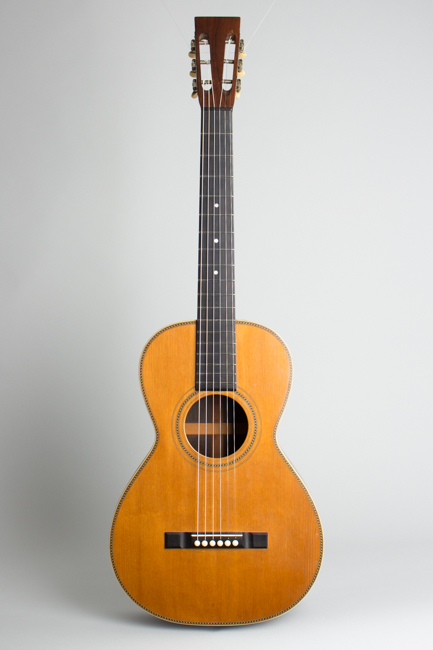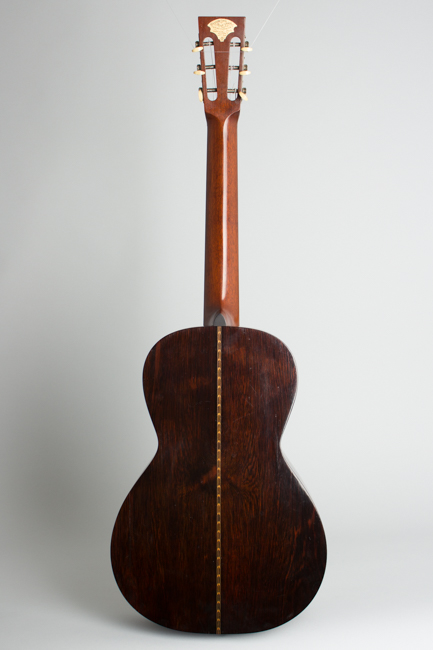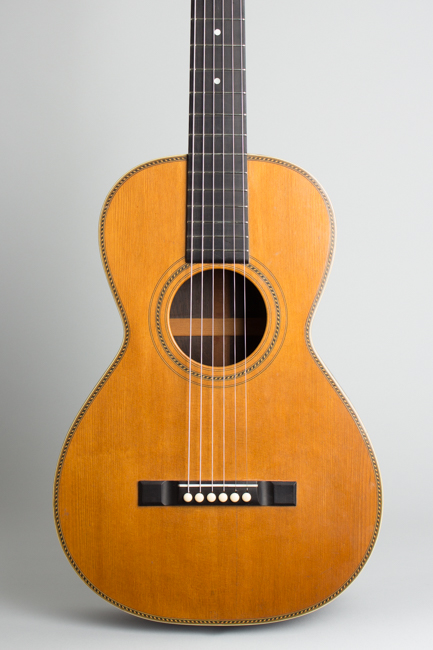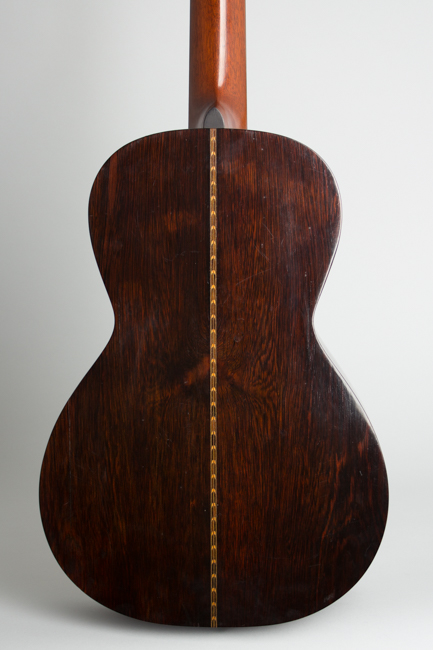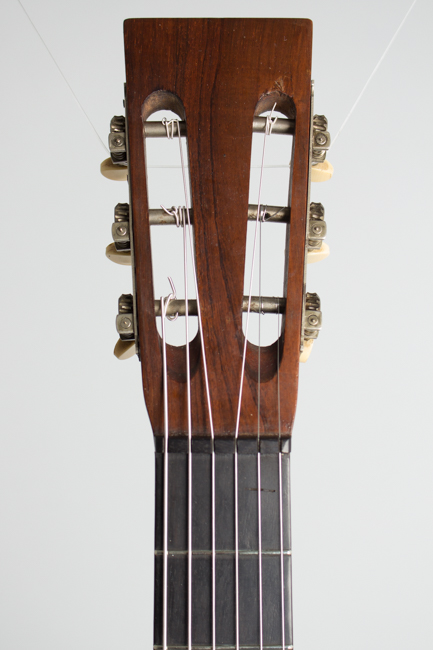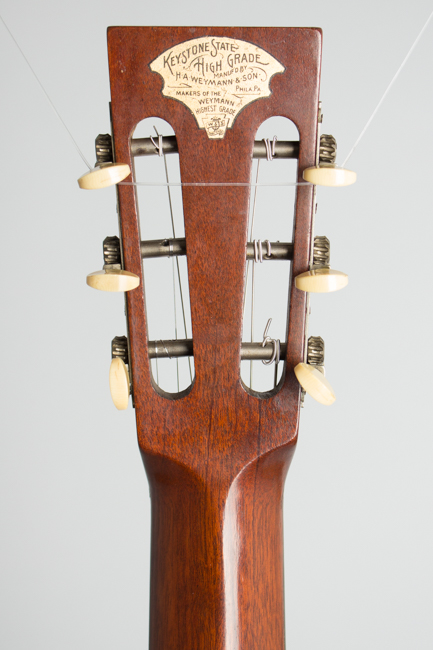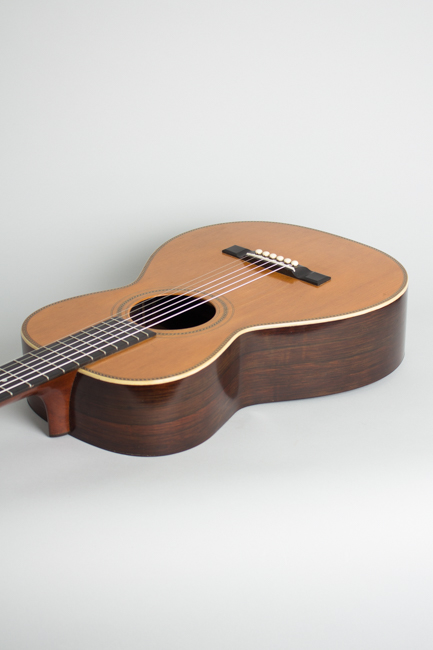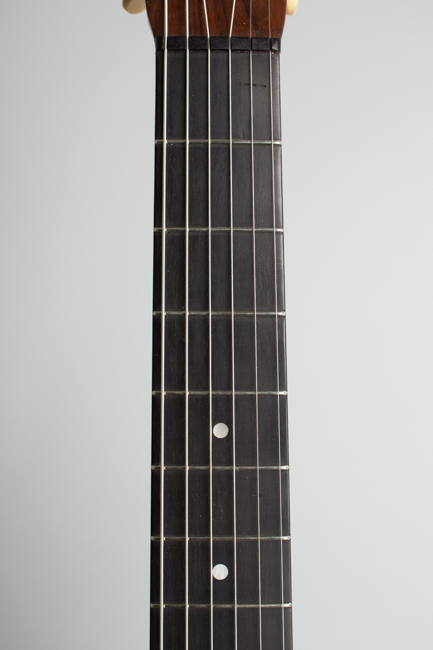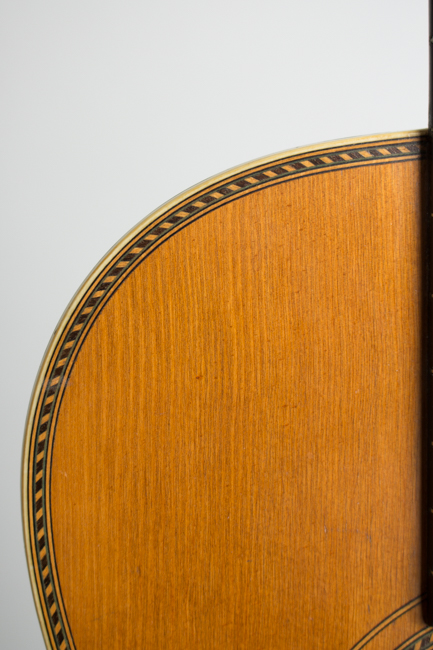Weymann High Grade Flat Top Acoustic Guitar , c. 1908
This item has been sold.
Item # 8433
Prices subject to change without notice.
Weymann High Grade Model Flat Top Acoustic Guitar, c. 1908, made in Philadelphia, PA, serial # 8003, natural varnish finish, Brazilian rosewood back and sides, sprice top; mahogany neck with ebony fingerboard, black tolex hard shell case.
H. A. Weymann & Son was founded by German immigrant Henry Arnold Weymann in Philadelphia in 1852. It was originally a retail firm trading in goods such as jewelry and watches, much of it imported from Germany. When Henry died in 1892, his son Harry William Weymann took over and steered the business more into musical goods, which they began to build as well as import.
Weymann's 1900s flat-top guitars are high quality instruments, broadly similar to those of C. F. Martin & Co. and Lyon & Healy. Records indicate the Weymann store sold Martin guitars at times, so they were certainly familiar with their Pennsylvania neighbor's designs! Weymann's lower priced guitars and banjos were sold under the "Keystone state" brand name, while better models like this one carry a "Weymann High Grade" designation with the decorative gold decal on the headstock rear.
Like most Weymanns of this era, this is a small-bodied flat-top guitar -- at least by modern standards -- equivalent to a Martin Size 1. The back and sides are finely grained Brazilian rosewood, the top is spruce, and the mahogany neck has an ebony fingerboard. The top and sound hole are bordered with half-herringbone marquetry and colored wood strips. The fingerboard has three pearl dots, while the tuners are the standard Waverly machines common to the period.
As was common at the time, the top is neatly ladder braced and the whole guitar very lightly built. Originally intended for gut strings, it is quite suitable for silk & steel stringing today. Weymann products in general show a very high degree of craftsmanship typical of German-descended firms, and this one is no exception -- a truly lovely parlor guitar with an enchanting sound.
Overall length is 37 in. (94 cm.), 12 3/4 in. (32.4 cm.) wide at lower bout, and 3 7/8 in. (9.8 cm.) in depth at side, taken at the end block. Scale length is 25 in. (635 mm.). Width of nut is 1 7/8 in. (48 mm.).
This is an exceptionally nicely preserved and amazingly original guitar for its age, especially as it has been on earth for well over a century! The finish is all original with only light wear, mostly superficial scuffs and dings. The neck has been neatly reset and the original bridge reglued and given a new slightly compensated saddle. There are two tight rosewood grain crack repairs on the back, the larger on the lower treble bout. The top shows two well-sealed grain cracks, one below the bridge behind the B string and one on the face just below the bass side of the fingerboard on the sound hole edge. There has been no added finish with any of these repairs.
The frets have been neatly dressed and this is a very lovely sounding and fine playing guitar, originally built for gut strings but well suitable for silk and steel stringing. We rarely find guitars of this era and quality that are as functional and as original as this one. The great majority of older pre-war (WWI, that is) rosewood instruments still extant show the effects of decades of wear, neglect, and often poorly judged repairs. This little Weymann a delight to play with a very responsive and somewhat "reverby" tone, a ticket back to the gilded age. Excellent - Condition.
H. A. Weymann & Son was founded by German immigrant Henry Arnold Weymann in Philadelphia in 1852. It was originally a retail firm trading in goods such as jewelry and watches, much of it imported from Germany. When Henry died in 1892, his son Harry William Weymann took over and steered the business more into musical goods, which they began to build as well as import.
Weymann's 1900s flat-top guitars are high quality instruments, broadly similar to those of C. F. Martin & Co. and Lyon & Healy. Records indicate the Weymann store sold Martin guitars at times, so they were certainly familiar with their Pennsylvania neighbor's designs! Weymann's lower priced guitars and banjos were sold under the "Keystone state" brand name, while better models like this one carry a "Weymann High Grade" designation with the decorative gold decal on the headstock rear.
Like most Weymanns of this era, this is a small-bodied flat-top guitar -- at least by modern standards -- equivalent to a Martin Size 1. The back and sides are finely grained Brazilian rosewood, the top is spruce, and the mahogany neck has an ebony fingerboard. The top and sound hole are bordered with half-herringbone marquetry and colored wood strips. The fingerboard has three pearl dots, while the tuners are the standard Waverly machines common to the period.
As was common at the time, the top is neatly ladder braced and the whole guitar very lightly built. Originally intended for gut strings, it is quite suitable for silk & steel stringing today. Weymann products in general show a very high degree of craftsmanship typical of German-descended firms, and this one is no exception -- a truly lovely parlor guitar with an enchanting sound.
Overall length is 37 in. (94 cm.), 12 3/4 in. (32.4 cm.) wide at lower bout, and 3 7/8 in. (9.8 cm.) in depth at side, taken at the end block. Scale length is 25 in. (635 mm.). Width of nut is 1 7/8 in. (48 mm.).
This is an exceptionally nicely preserved and amazingly original guitar for its age, especially as it has been on earth for well over a century! The finish is all original with only light wear, mostly superficial scuffs and dings. The neck has been neatly reset and the original bridge reglued and given a new slightly compensated saddle. There are two tight rosewood grain crack repairs on the back, the larger on the lower treble bout. The top shows two well-sealed grain cracks, one below the bridge behind the B string and one on the face just below the bass side of the fingerboard on the sound hole edge. There has been no added finish with any of these repairs.
The frets have been neatly dressed and this is a very lovely sounding and fine playing guitar, originally built for gut strings but well suitable for silk and steel stringing. We rarely find guitars of this era and quality that are as functional and as original as this one. The great majority of older pre-war (WWI, that is) rosewood instruments still extant show the effects of decades of wear, neglect, and often poorly judged repairs. This little Weymann a delight to play with a very responsive and somewhat "reverby" tone, a ticket back to the gilded age. Excellent - Condition.
